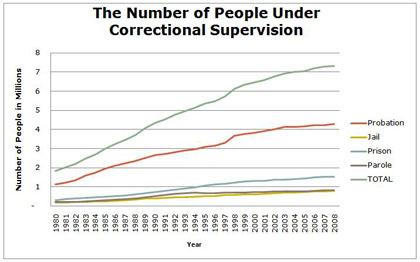In partnership with Temple University’s Multimedia Urban Reporting Lab, the university’s capstone journalism class, students Chelsea Leposa and Jared Pass will cover neighborhood technology issues for Technically Philly and Philadelphia Neighborhoods through May.
###
“I’m an individual that wants to try and get ahead in life,” says Hymine, 53, an ex-felon who reentered society in 1992 after spending a year in prison for drug possession, who asked Technically Philly to not share his real name.
Hymine’s story illustrates the difficulties and inequalities ex-offenders often face upon returning to society.
Hymine says that he is a military veteran. He served in the Army and the Army Reserves from for two decades in the ’70s and ’80s. He is also well educated. He received a bachelor’s degree in Political Science from Cheyney University in 1987. In 2006, he returned to Cheyney and received his Master’s in Public Administration. In addition he is currently working on his Doctorate in Human Services through an online program.
Even with his impressive resume, Hymine says finding employment is challenging. “I have one little smear and they treat me like I ain’t shit,” Hymine says.
Upon his return from prison, Hymine went to work at a supermarket for five years. “My supervisor would tell me, ‘You’re an ex-offender and you’re never gonna get a better job,” Hymine recalls.
After leaving the supermarket, Hymine went to work at Saint Gabriel’s Hall at New Morgan Academy, and the Pennsylvania Clinical School, where he helped at-risk youths. He has been unemployed since 2005, and believes that his criminal record is preventing him from getting a reasonable position with reasonable pay.
Susan Guggenheim, who runs a ex-offender technology training program, says, “The society at large needs to get over this thing of penalizing ex-offenders twice, once during their period of incarceration and forever after when they come out.”

Hymine is tired of the inequality and refuses to settle for just any job. “They try to underpay you,” he says. He wants a position that looks past his record, treats him as an equal and pays him based on his education and experience.
Matty Hart, the national director for public engagement at Solutions for Progress, a public policy technology company, says, “Ex-offenders are being filtered out because they’re felons.” To give themselves more job opportunities ex-offenders need to have basic technology and education skills. “Ex-offenders need access to high-level, high-quality tech training.”
Believing there is no such thing as too much education, knowledge and training, Hymine has gone through numerous re-entry programs. When asked why he keeps going he simply shrugs his shoulders and asks, “Why not?”
“Ex-offenders try to do the right thing, but give up because they don’t have the support,” he says. “If I didn’t have the support I had, I would have been the same way.”
Guggenheim’s computer training class was one source of support Hymine had after returning to Cheyney University in 2006. In Guggenheim’s class, Hymine learned basic computer skills from using the internet to Microsoft Word.
“There is a gap in time and a gap in training. When they went in technology was at a certain point, and when they come out its radically different because of the speed technology develops,” says Guggenheim.
At first Hymine struggled with computers in his college classes. However, after attending Guggenheim’s program he feels confident on a computer. “Her class helped me be independent,” he says.
Watch a video about the ex-offender computer training program. Story continues below.
[viddler id-9788fdd5 h-357 w-420]
The basic computer skills Guggenheim teaches are important for ex-offenders to find work. “These are basic skills in the workplace that everyone has to have,” says Hart. Technology is unavoidable, and most businesses utilize some sort of computer technology.
“The biggest disadvantage ex-offenders have is two-fold; they do not have computers and they do not have broadband access, so they’re basically crippled,” says Guggenheim.
Computer skills are also used to find work. Hymine said he went online to CareerBuilder to search for jobs. “This time last year I was applying for six or seven jobs a day,” he says.
Guggenheim has worked in several groups helping ex-offenders create online resumes using job search websites. She said, “The problem is that there is always that question, regardless of your crime, regardless of how long ago it happened, it always says, have you ever been convicted of a crime?”
Hymine is passing on the expertise that Guggenheim gave him in his volunteer work at the National Center for Children and Families. There he helps ex-offenders put together their resumes, which they can post online. Hymine also teaches them basic computer skills, such as copying and pasting, using flash drives, and searching the web.
There are also other ways ex-offenders can utilize online technology. Hart believes it is good for ex-offenders to harness social networking sites to connect with employers. “Just establish yourself on the web,” he says. If an employer sees someone has a professional online profile, it shows they’re up to speed. “When someone reaches out to me, the first thing I do is check their Facebook or LinkedIn profile,” says Hart.
Hymine is currently hoping for a pardon, which will expunge his felony record. “All it does is cover it up, and it only shows up again if you get in trouble,” says Hymine. He believes there is a good chance he will receive the pardon because it has been about 20 years since his conviction and he has stayed out of trouble. In addition, he has six letters of recommendation, including one from Guggenheim.
Hymine expects that, “after the pardon everyone is going to want to be my friend,” due to his extensive education and impressive resume. After the pardon he anticipates that he will have no further difficulties finding employment.
Join the conversation!
Find news, events, jobs and people who share your interests on Technical.ly's open community Slack

Philly daily roundup: Jason Bannon leaves Ben Franklin; $26M for narcolepsy treatment; Philly Tech Calendar turns one

Philly daily roundup: Closed hospital into tech hub; Pew State of the City; PHL Open for Business

A biotech hub is rising at Philadelphia’s shuttered Hahnemann Hospital campus

